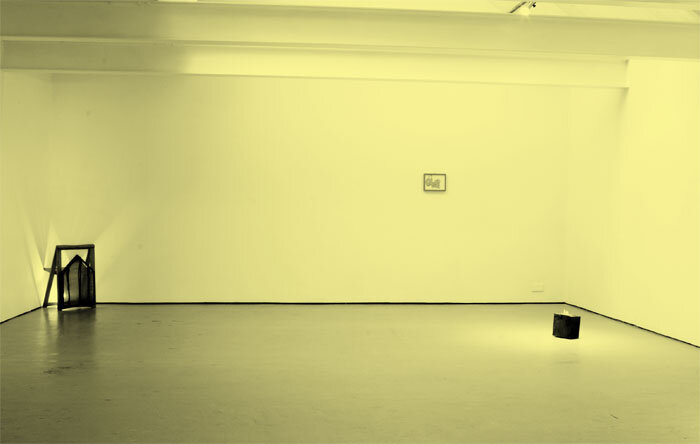#59 Lucy Conochie, Love & War
2 - 21 September
Lucy Conochie was born in Harlow, England. She graduated from Slade School of Art (MA) in 2007 Love & War is her first solo show. Conochie currently lives and works in London.
A conversation between Lucy Conochie and Benjamin Rowan Brett, 1st September 2009.
LC: I want to tell you a story.
A friend of mine told me he used to have recurring dreams of valleys lined with trees and undergrowth. He said these valleys were like the settings, like the backdrops for the dreams. As he was telling me I was imagining the valleys, their density, their darkness, the green, and everything that could be shrouded by them. I tried to remember my own dreams from childhood. I remembered the interiors of familiar houses as my recurring scenes. I was disappointed that he had outside dreams and I had inside dreams, as if he had afforded himself some kind of freedom I had overlooked. Yesterday I realised I have never done a painting of an interior, and when I unwrapped my painting (‘Wall’) Sam Jeffrey sad it made him think of a bad dream.
BRB: Your painting, to me reveals the parameter or boundary of an interior. The uniform brushmarks, that make up the surrounding landscape create a flatness that suggests something continuous or infinite. This reminds me of an Edward Hopper mise en scene. However in his paintings a similar expansiveness is usually conveyed from within an interior, alluding to a sense of solace in melancholy through the subjects depicted. You talk about the difference between an interior and an outdoor setting. Do you feel the outdoors always represents a sense of freedom?
LC: I feel like I want to say yes, to be romantic, but I see that fear happens anywhere, perhaps more so in nature. I think the ability to feel something, or something about to happen, is what I mean as freedom, and for me the outdoors always lends itself as a way to describe this. So, yes.
BRB: I suppose the word freedom isn’t always romantic. In a certain context freedom might imply an absence of constraint or that humans are “condemned to be free”.
LC: Do you feel free?
BRB: I’m free tonight [to continue this discussion]. Laughs. That’s a difficult question to answer I suppose.
LC: It’s the eternal question.
BRB: I wanted to ask about the relationship between text and image that often presents itself in a similar medium. What do you feel is the significance of the painted text work in relation to the language of the paintings and the drawings?
LC: I don’t see any difference between them. They all operate on the same level, and I hope they do also for the viewer. It’s all just communication.
BRB: We’ve reached the end of the A4 paper.
LC: OK, it’s the end.

